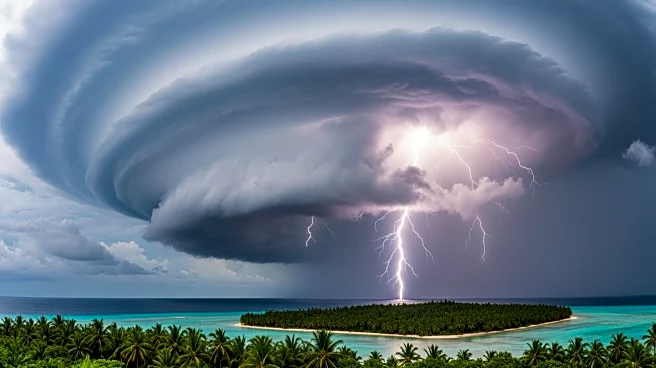What's Happening?
Hurricane Melissa has intensified to a Category 5 storm, marking it as potentially the strongest hurricane to hit Jamaica since record-keeping began in 1851. The storm is expected to cause catastrophic
impacts, including life-threatening flash flooding, landslides, and destructive winds. Sustained winds near the center of the hurricane are anticipated to reach around 160 mph at landfall, with higher gusts possible in mountainous regions. The hurricane has already resulted in fatalities in Haiti and the Dominican Republic, and is predicted to lead to extensive infrastructure damage, prolonged power and communication outages, and isolated communities in Jamaica. Climate change is amplifying the ferocity of hurricanes like Melissa, underscoring the urgent need for global action to reduce emissions and bolster coastal defenses.
Why It's Important?
The intensification of Hurricane Melissa highlights the growing impact of climate change on weather patterns, particularly in the form of more frequent and severe hurricanes. This poses significant risks to island nations and coastal areas, where infrastructure and communities are vulnerable to such extreme weather events. The storm's potential to cause widespread damage in Jamaica underscores the need for investment in early warning systems, sea walls, and other infrastructure to enhance resilience against climate impacts. The situation also emphasizes the urgency for global efforts to reduce greenhouse gas emissions, as warming oceans contribute to the rapid intensification of storms, increasing the likelihood of catastrophic events.
What's Next?
As Hurricane Melissa approaches Jamaica, preparations are underway to mitigate its impact. Authorities are likely to focus on evacuation plans, emergency response coordination, and post-storm recovery efforts. The international community may also increase support for affected regions, providing aid and resources to assist in rebuilding efforts. Additionally, the storm's impact may prompt renewed discussions at upcoming climate talks, emphasizing the need for decisive action to address climate change and its effects on vulnerable regions.
Beyond the Headlines
The intensification of Hurricane Melissa serves as a stark reminder of the ethical and environmental challenges posed by climate change. It highlights the disproportionate impact on small island nations, which often bear the brunt of extreme weather events despite contributing minimally to global emissions. This situation raises questions about climate justice and the responsibility of larger, more industrialized nations to support vulnerable regions in adapting to and mitigating climate impacts.









